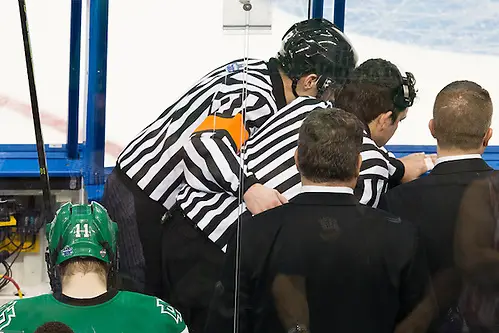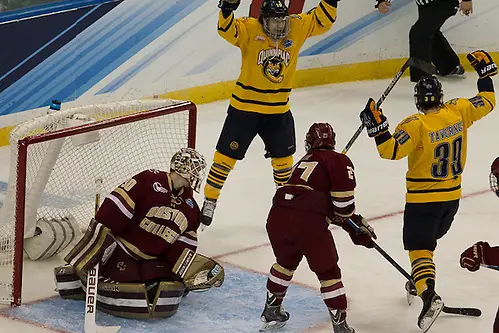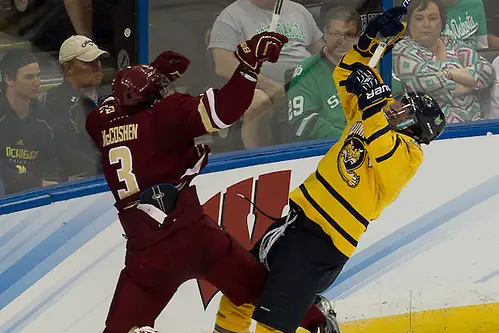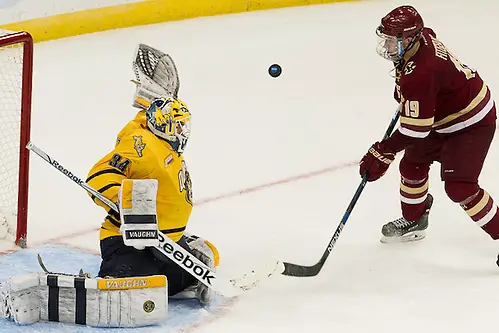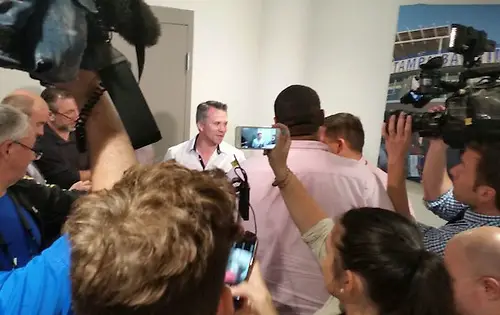
TAMPA, Fla. – It’s sports cliché, for sure: Big players make big plays in big games.
In Thursday’s 4-2 semifinal win over Denver, North Dakota relied on the big players who have been go-to guys all season long.
[scg_html_ff2016]With the game tied at 2-2 and less than a minute remaining in regulation, Nick Schmaltz put the Fighting Hawks ahead, assisted by his linemates, Brock Boeser and Drake Caggiula. Together, the trio has become known as the CBS Line — the first letters of each of their last names — and together the three had accounted for 57 of North Dakota’s 153 goals entering Thursday’s contest.
Thursday, they were responsible for the first three UND goals. Caggiula scored twice in the second period to put the Fighting Hawks up 2-0 over the Pioneers, helped on his first goal by Boeser, who leads the team in goals with 26.
“We always joke around,” said Caggiula. “We tell him to pass the puck because all he does is score.”
While Boeser leads the team in goals, he’s only had a single marker in his last seven games, an unassisted goal in the second period of North Dakota’s 6-2 win over Northeastern in the semifinal game of the Midwest Regional. In those seven games dating back to March 11, however, Boeser has an even dozen assists.
“A lot of people don’t realize just how good his vision is and he can make plays all over the ice — not just scoring goals but he can definitely find you in open areas,” said Caggiula, a senior. “He made a great play on my first goal, an awesome saucer pass behind the defenseman. He’s a freshman but he doesn’t act like a freshman. Very mature kid on and off the ice, and I think that’s what makes him such a special person and such a special player as well.”
“He’s a fun player to play with,” said Schmaltz. “He thinks the game the same way me and Drake [do]. He likes to make plays. We like to make plays, but we also like to play hard away from the puck. I think that it’s a staple of our success, is how hard we play away from the puck and getting the pucks back and playing offense.”
It’s the whole-ice mentality, the hard work to play with and without the puck that makes the North Dakota team tick and especially the line that leads the team offensively.
“Obviously, that top line gets a lot of accolades,” said coach Brad Berry. “It’s well deserved. They played well the whole year offensively, but I think you just heard Nick Schmaltz say sometimes offensive players like to play with the puck and not so much without it. He made a note there that we’re a 200-foot team and we do it too, and again that’s a big deal for our team.”
On that final play of the game, said Berry, his players were doing exactly what they were supposed to do. The Pioneers had called a timeout with a minute to go in regulation and then promptly iced the puck when they returned to play, bringing the faceoff to the right circle in their own offensive zone. Berry and his coaching staff had a plan for that, but he credits his players for doing the work.
“They executed on the play we drew up,” he said. “In practice during a week, once or twice a week, we work on faceoff plays, offensive and defensive.
“They made the play. Big-time players make big-time plays. That’s what they do.”
In their three NCAA tournament games this year, the players on the CBS Line have scored a combined six goals and seven assists.
“It’s guys executing,” said Berry, “attention to detail of what we do every day in practice, and it reaped the rewards tonight because they were dialed in.”
